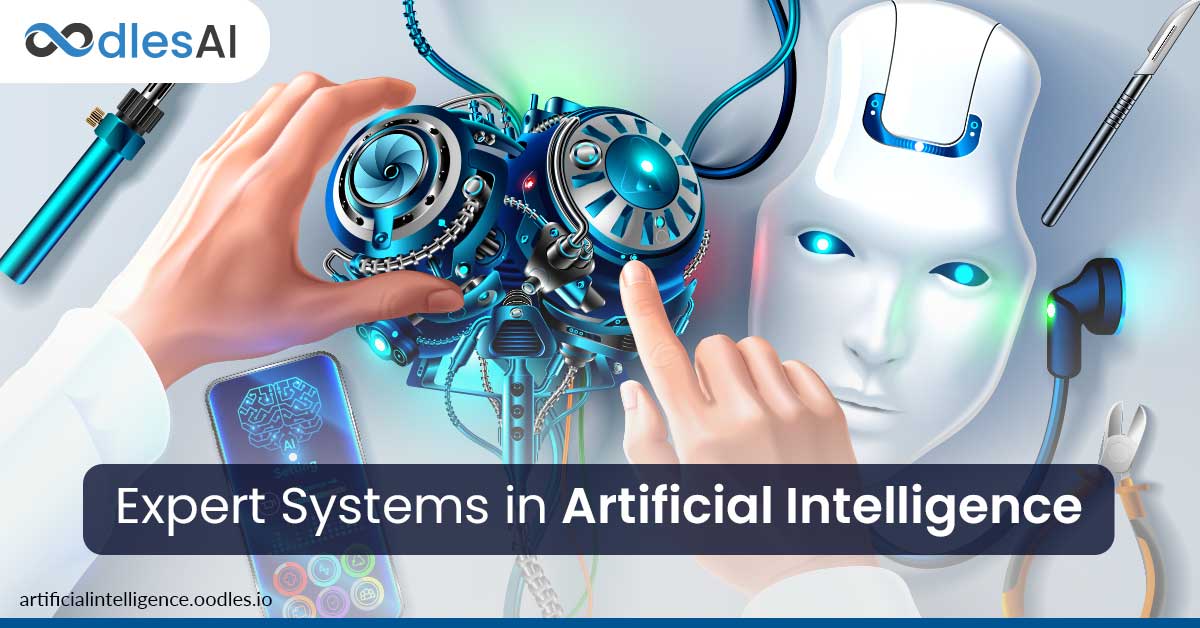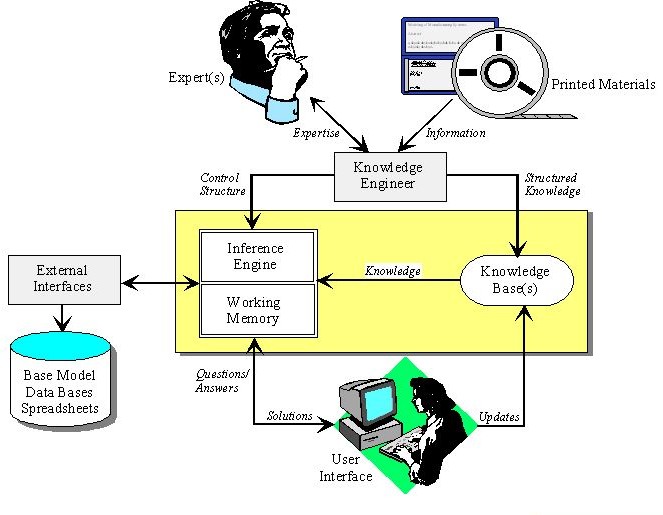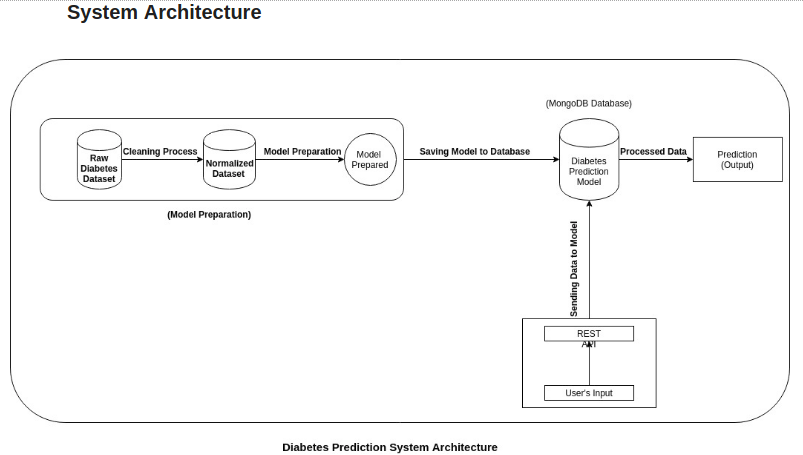Expert Systems in Artificial Intelligence: Applications and Opportunities
Sanam Malhotra | 22nd June 2020

Initiated as the avant-garde system under artificial intelligence (AI), expert systems have a history and business case worth exploring. The knowledge-driven systems are popular for paralleling human intelligence by using fixed rules and data. However, the role of expert systems in artificial intelligence is well beyond pre-defined outputs, expanding to recommendations, interactions, and predictions.
This blog post sheds light on the powerful duo of artificial intelligence services and expert systems to build effective business applications.
Understanding Expert Systems in Artificial Intelligence
Formally introduced in the 1960s, expert systems are computer programs that can emulate human intelligence and decision-making abilities using a rule-based approach. The technique is closely related to artificial intelligence for it enables machines to demonstrate human-like thinking capabilities through human knowledge.
Edward Feigenbaum is often termed as “the father of expert systems.”
To decode an AI expert system, let’s first understand the core of AI.
Under the vast umbrella of computer science, AI systems and techniques can be broadly divided into two categories, namely ‘Symbolic’ and ‘Subsymbolic’. While symbolic systems work explicitly on human knowledge in the form of symbols or rules, subsymbolic systems work partially on data and neural network-based calculations.
Expert systems are a type of symbolic AI as they completely rely on knowledge-base enveloping facts, data, and ‘if-this-then-that’ rules.
For this reason, AI expert systems are directed towards solving complex reasoning problems while exhibiting human-level intelligence and expertise. Unlike machine learning development that encompasses extensive model training, AI expert systems are programmed with comprehensive rules and domain-specific data to fetch pre-defined outputs.
It is, therefore, easier for businesses to build and deploy AI expert systems entailing the following advantages-
a) Easy development process
b) Low production costs
c) High efficiency with accurate knowledge-base
d) Minimum errors and risk involved, and
e) Steady response rate.
However, to build expert systems, it is essential for businesses to pre-determine the characteristics of the problem and provide a rich knowledge base.
Structure of Experts Systems in Artificial Intelligence

There are 3 main components of expert systems in artificial intelligence, namely-
1) Knowledge base
The knowledge base represents the information warehouse of expert systems, comprising of all the stored information acquired from human experts and other sources. In addition, the knowledge base envelopes a long list of rules, facts, and figures that can be categorized into factual and heuristic knowledge.
2) Inference Engine
Acting as the brainpower of the expert system, the inference engine processes the information and applies rules to deduce an output. For both deterministic and probabilistic types of outputs, inference engines use two approaches to generate output, i.e. forward chaining, and backward chaining.
3) User Interface
To present the final output or solution, expert systems use a user interface as a channel fo communication with the end-user.
Apparently, a precise knowledge base and well-defined rules are the most essential elements of expert systems in artificial intelligence. Let’s explore some evidence-based applications of AI expert systems that propel business automation significantly.
Also read- AI Explained: Rule-based AI Vs Machine Learning for Enterprises
Applications of Expert Systems in Artificial Intelligence Domain
1) Automatic Speech Recognition
For small-scale projects expert systems in speech recognition is an ideal AI technique to identify well-defined human speech and generate output. The application of speech recognition can be deployed for various business use cases, such as-
a) Chatbots and virtual assistants for travel, insurance, healthcare, and other domains
b) Search for reports and documents for large datasets
c) Execute tasks such as calling, messaging, printing, scheduling meeting, etc.
d) Recording travel arrangements, minutes of conferences, and more.

We, at Oodles, embedded speech recognition functionality in a chatbot that provides instant movie synopsis built by using expert systems and model training approach.
Expert systems for automatic speech recognition breaks down human linguistics in the form of rules and structures. Contrary to the model training approach, AI expert systems use prosodical rules including pitch, energy, and duration to segment speech signals in sentences and words.
Also read- Building Healthcare Chatbots for COVID-19 Awareness and Diagnosis
2) Medical Diagnosis and Predictions
Healthcare systems produce prodigious amounts of data annually including patient, demographic, clinical, and billing data. Expert systems in healthcare can channelize this data to deduce new knowledge and prediction to improve diagnosis. For this purpose, algorithmic advancements coupled with data mining techniques are beginning to strengthen traditional expert systems.
MYCIN was the first well-established medical expert system that assisted unskilled doctors in prescribing antimicrobial drugs for blood infections. Other use cases of AI expert systems in healthcare diagnosis include-
a) Prediction of chronic and infectious diseases
b) Analysis of laboratory reports
c) Providing accurate diagnosis by inferring symptoms, medical history, and lab tests.
For improving medical diagnosis, the Oodles AI team built a diabetes prediction model that can evaluate sugar level in patients without human intervention. The system achieved over 90% accuracy in testing diabetes with ease, efficiency, and convenience. Below is the system’s architecture-

Also read- Improving Diagnostics with AI-powered Predictive Analytics in Healthcare
Developing Expert Systems in Artificial Intelligence with Oodles
In these uncertain times, we, at Oodles, are making every possible effort to improve existing healthcare, communication, and other essential services with artificial intelligence. Our AI team is building and deploying advanced AI applications in diverse domains such as customer services, eCommerce, healthcare, etc. to streamline and enhance business processes.
With extensive experience in curating knowledge base and handling if-then rules, our team can build effective AI solutions for-
a) Automating customer interactions across the web and social media platforms
b) Improving medical diagnosis with accurate predictive models
c) Assessing risk of COVID-19 at remote locations with virtual assistants, and more.
Connect with our AI development team to learn more about our artificial intelligence services and capabilities.



